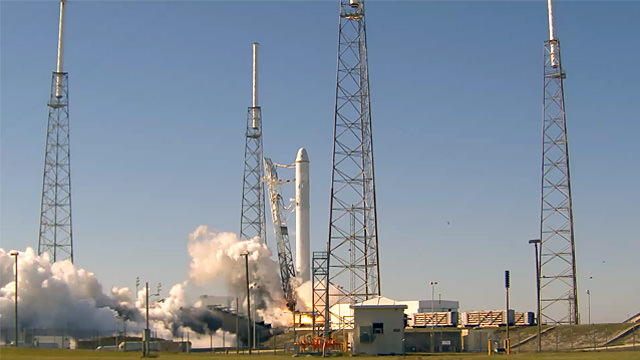[/caption]
The third time was a charm for SpaceX's static fire of the Falcon 9 rocket, with a successful 2-second test of the nine engines, clearing the way for a launch next week for a NASA demonstration mission. SpaceX said preliminary he data analysis showed the engine test firing went as expected. An earlier try on Friday and then again Saturday morning ended in a-computer controlled abort.
SpaceX said the launch of the rocket, carrying a demonstration Dragon capsule could occur as early as December 7th, with December 8th and 9th as backup days. The weather prediction for Tuesday, however is for cold temperatures and high winds and they estimate a 40% chance for "go" that day. The launch window for all three days extends from 9:00 a.m. to 12:22 p.m. EST, from Launch Complex 40 at Cape Canaveral Air Force Station in Florida.
From
SpaceX:
"The Dragon capsule is expected to orbit the Earth at speeds greater than 17,000 miles per hour, reenter the Earth's atmosphere, and land in the Pacific Ocean roughly 3 1/2 hours later. This will be the first attempt by a commercial company to recover a spacecraft reentering from low-Earth orbit. It is a feat performed by only 6 nations or government agencies: the United States, Russia, China, Japan, India, and the European Space Agency."
There will be a webcast of the launch on the
SpaceX website
that will begin approximately 45 minutes prior to the opening of the daily launch window, at 8:15 a.m. EST / 5:15 a.m. PST / 13:15 UTC. During the webcast, SpaceX hosts will provide information specific to the flight, an overview of the Falcon 9 rocket and Dragon spacecraft and commentary on the launch and flight sequences. There will be a post-mission news conference at the Kennedy Space Center.
On Sunday, a Russian rocket launched with three new navigation satellites but failed to reach orbit, and some reports say the satellites crashed into the Pacific Ocean after launch.
See more from
Tariq Malik at Space.com
Aviation Week as a great retrospective article on the space shuttle.
 Universe Today
Universe Today
